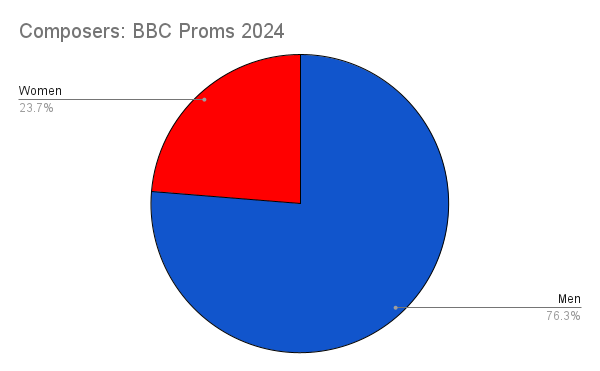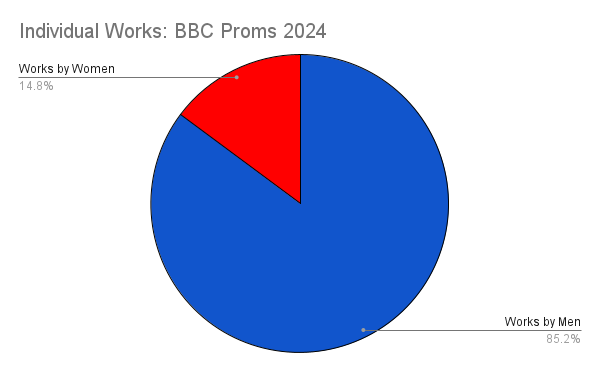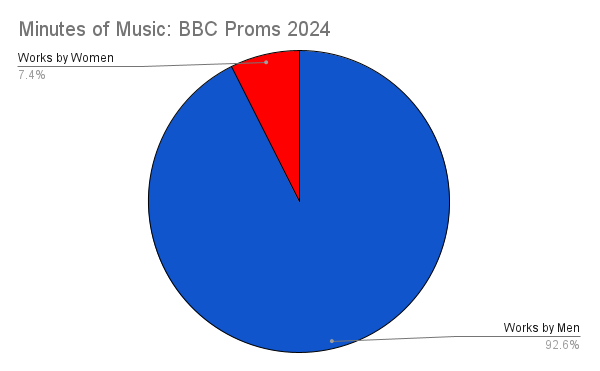The 2024 BBC Proms began on July 19 and will continue through September 14, bringing hundreds of hours of music to Royal Albert Hall and other venues across the United Kingdom. This annual event – which has presented music since Henry Wood founded the Proms in 1895 – is always a highlight of the classical music world. Many of the concerts are available free to the public, either because they are presented in open air spaces or because they are broadcast through the BBC either on television or radio. It’s not an understatement to say that this festival, which classical music enthusiasts the world over look forward to each year, provides a prime opportunity to introduce new music to the masses, educate about underperformed composers, and help foster dialogue and forward thinking on the equitable future we wish to see in classical music performances. However, as we see in American orchestral programming, the opportunity for great discussions and change is often left by the wayside.
For some historical context, it was only in 2013 that a woman, Marin Alsop, conducted The Last Night of the Proms concert. In a video recording of her speech from that night you can see that the podium is decorated with pink balloons and “It’s A Girl!” signs, while Alsop makes note in the traditional Last Night speech from the conductor of how frustrating it is that there are still such important things for women to be the first at. While women composers, particularly British women composers, have been heard at the Proms throughout the years, dating back to premieres by Henry Wood, himself, the imbalance of representation of women remains striking.
The BBC Proms website offers a great deal of information for each of the 90 performances that will be presented in the 2024 Proms season. Though the Proms offers a variety of performances – soloists, choirs, jazz ensembles, chamber music, etc. – we chose to follow the example of our repertoire reports for American orchestras and look only at the orchestral performances as we consider the ways in which work by women is represented at this hugely influential festival. Orchestral performances are also the dominant concert type at Proms. While we acknowledge that works by women are also being performed in other concerts – like children’s programming, and choral concerts – the focus of our work at Women’s Philharmonic Advocacy is to lift the work of women orchestral composers.
Works by 93 different composers will be heard during the proms, 22 of which are women. While that makes up a noteworthy nearly 25% of the total, other data reminds us that it’s not just how many women are at the table, but also who is allowed to speak.
A total of 169 different works will be heard by the different orchestras appearing over the eight weeks of Proms concerts. Of those only 25 works are by women composers, a total of about 14.8%.
The figures become more alarming still, when we consider the average length of any given work. As the BBC website provides running times for each work, we can easily calculate how much actual time women’s work is being heard. When adding up all of the orchestral performances, about 80 hours of music will be performed this season – a total of 4,765 minutes. Of that time, works by women will take up 351 minutes, or about six hours.
Calculated further, the average length of a work composed by a woman is 14 minutes. The high water mark is the 40-minute long Mary Lou Williams’ Zodiac Suite which will receive its UK Premiere in Prom 35 (concert #35). On the other side, the shortest work by a woman is Lili Boulanger’s Pie Jesu which is timed at four minutes.
The average length of a work composed by a man is 30 minutes. Georges Bizet takes the crown for the longest piece at the Proms this year, as they will present a semi-staged version of the opera Carmen. The shortest is tied among several works at two minutes each, including the tradition of including Auld Lang Syne and Rule, Britannia in the last night festivities. Unsurprisingly, the usual suspects sit as having the most works performed: Mozart has eight, Beethoven and Bruckner are tied in second place each with a total of seven works (BTW it is Bruckner’s 200th anniversary year), and Tchaikovsky comes in third with six works. These four composers combined have more works being performed than all of the women composers put together.
There are notable inclusions throughout the season – for example, Clara Schumann’s Piano Concerto was performed on the First Night of the Proms (you can listen to a recording here). There are many historic composers included, as well as contemporary. Lili Boulanger is the most performed woman composers, with three works included (D’un soir triste, Pie Jesu, and Vieille prière bouddhique), followed by Louise Farrenc with two (Symphony No. 3 and Overture No. 1). Other women composers that will be heard are:
Grażyna Bacewicz
Mel Bonis
Doreen Carwithen
Anna Clyne
Cheryl Frances-Hoad
Sarah Gibson
Jennifer Higdon
Augusta Holmes
Dani Howard
Vítězslava Kaprálová
Elizabeth Kelly
Missy Mazzoli
Cassandra Miller
Niloufar Nourbakhsh
Lara Poe
Kaija Saariaho
Clara Schumann
Germaine Tailleferre
Grace Williams
Mary Lou Williams
Someone that I find to be notably missing is Dame Judith Weir, Master of the King’s Music. Though she will have a work performed in a choral concert, why is none of her orchestral work included? According to her publisher, she has been quite busy in recent years, and wouldn’t these concerts, celebrating British culture, be the perfect place to showcase such a prolific and esteemed composer?
I noted the historic inclusion of Marin Alsop to conduct the Last Night of the Proms in 2013. She conducted the last night again in 2015 and 2023. Only one other woman has conducted the Last Night; Dalia Stasevska in 2020 and 2022. While the First Night of 2024 was conducted by Elim Chan, a woman wasn’t chosen for the last night duties this year. Of the 41 conductors who will be raising their batons for orchestral concerts at the Proms this year, a total of eight are women, which is about 19.5%.
These women are:
Anja Bihlmaier
Anna-Maria Helsing
Chloe Rooke
Dalia Stasevska
Elim Chan
Gemma New
Nil Venditti
Tianyi Lu
As is evident in the very real data collected and shared by the presenters themselves, we have a problem in classical music that extends beyond any individual country. And, as I mentioned in the 2024-2025 Repertoire Report shared last spring, this problem needs to be addressed and progress made toward its solution if there is any hope of this artform, that is so meaningful and important to so many, is going to thrive. Classical music must grapple with this uncomfortable and unfortunate history and find a way to move forward in a way that recognizes all voices in classical music as equally important in the shaping and development of music throughout history.



